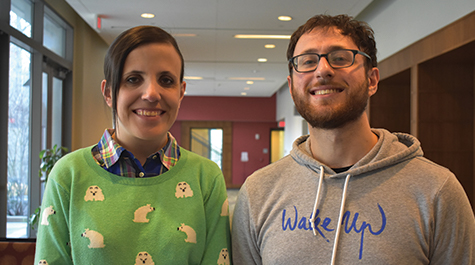Building a community of support for students in recovery
College can be stressful. For students in recovery from drug and alcohol addiction, the stresses of college life can be even greater. A new student-led initiative, the W&M Collegiate Recovery Program, seeks to offer a safe space and a community of support for students in recovery — while also reducing the stigma of addiction on campus.
A growing trend on college campuses, collegiate recovery groups are one tool universities are using to address substance abuse and support students’ emotional growth. Although the idea of a campus-based recovery group at W&M has long been discussed, it finally came to fruition this year when Alex Hilert, a doctoral student in Clinical Mental Health & Addictions Counseling at the School of Education, stepped up to lead the program.
“In general, college is not very friendly to people pursuing a sober lifestyle,” said Hilert. “We’re hoping to create a community that will be a support system and offer alternative ways for students to make connections."
As an intern at the New Leaf Clinic, Hilert has worked closely with W&M students and other clients who are exploring their usage of alcohol and drugs. New Leaf is a training clinic, housed in the School of Education, that offers substance-abuse counseling services using motivational interviewing techniques to encourage students to take ownership of their decisions and make positive changes in their lives. Although many of the clinic’s clients are mandated to attend counseling after receiving alcohol or other drug sanctions from the Office of Student Conduct, the clinic also welcomes students who voluntarily seek their counseling services.
Daniel Gutierrez is an assistant professor of counseling and directs the New Leaf Clinic. “When I speak around campus about New Leaf and the services we offer, I usually end with an explanation of the Collegiate Recovery Program and what it offers students,” said Gutierrez. "And when I get back to my office, I always find lots of emails waiting for me. Students are really looking for a safe space to discuss this topic, a place where everyone is invited and everyone feels welcome.”
The group is not just for students in recovery from drug or alcohol abuse. “We define ‘recovery’ very broadly,” said Hilert. “It’s a place to connect with other people who are working to better understand themselves and who are making often difficult changes so they can lead healthier, fuller lives."
Entirely student-led, the group’s format and activities will develop over time as members themselves decide what will best address the needs that are specific to the W&M campus and the students here.
"I can’t say that there is more or less drug use at W&M than at your typical campus, but I can say that there is probably more than your average amount of antecedents to drug use: stress, perfectionism, competition,” shared one student who has attended recovery group meetings. "The reason I wanted to get involved in a recovery group on campus is because people need a place to just get real and be honest about what they feel and what they’re dealing with.”
The recovery group also aims to raise awareness about the experiences of addiction and create a climate of support on campus.
Kat Sperandio, another doctoral student in counseling who has worked with Hilert to get the program off the ground, hopes the group will play an important role in reducing the stigma of addiction and recovery. “The notion of recovery is relatively silenced on our campus and we’re hoping that this kind of community will bring a bigger voice to these students,” she explained.
The program has strong support from across campus and is a result of collaboration among the various departments, support services and student peer groups devoted to health and wellness that exist on campus.
“Those in recovery bring a wisdom and perspective that our community needs,” said Kelly Crace, associate vice president for health & wellness and director of the Office of Health Promotion. “In return for the gifts they bring, we need to make sure they see this community as safe, supportive and inclusive. This program moves us closer to that kind of environment.”
The recovery program aligns with the university’s commitment to a holistic approach to health. This fall, the new McLeod Tyler Wellness Center will open, bringing many of the university’s health, counseling and wellness programs and services under one roof. Plans are already underway to provide a space within the new wellness center for the recovery group to meet. “We want to convey the message that recovery is a form of resilience, flourishing and wellness,” said Crace.
Hilert and Gutierrez hope that the recovery program will provide a new avenue for students to begin exploring their relationship with drugs and alcohol and raise awareness about the counseling and other support services that are available at New Leaf and across campus.
“We want to give students the hope they need to believe they can recover and the space they need to be vulnerable—so that students are living recovered lifestyles, not just avoiding relapse,” said Gutierrez.
One W&M junior who has joined the recovery group but preferred to remain anonymous explained why he got involved. “Recovery is not all about stopping drug use, though that’s the necessary foundation,” he shared. “Rather, it is about learning how to connect with others meaningfully and learning how to embrace and handle all the messy feelings and experiences that constitute a human life.
“If we can create a community on campus that helps students to embrace their humanity, their feelings and their difficulties, I believe it would be a tremendous boon to our mental health and happiness.”
To learn more about the W&M Collegiate Recovery Program, email Alex Hilert at [[ajhilert]].
Learn more about the New Leaf Clinic and their free counseling services here.
